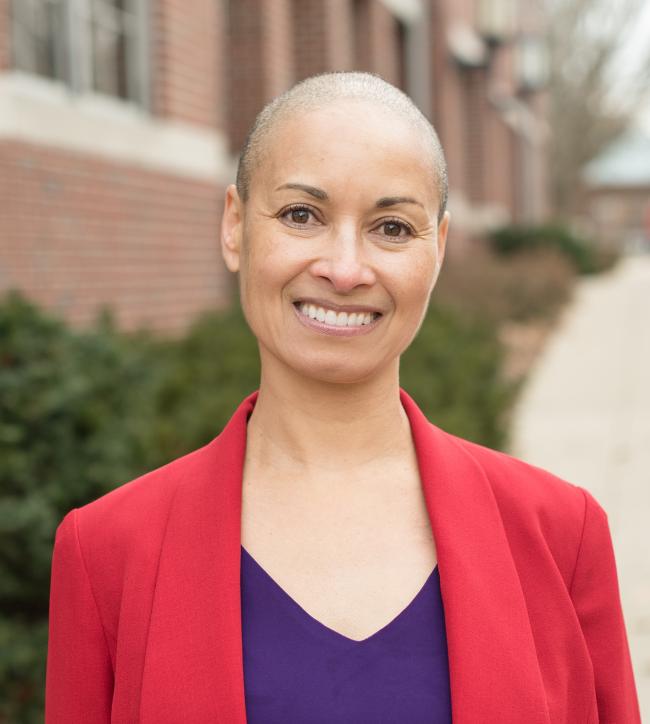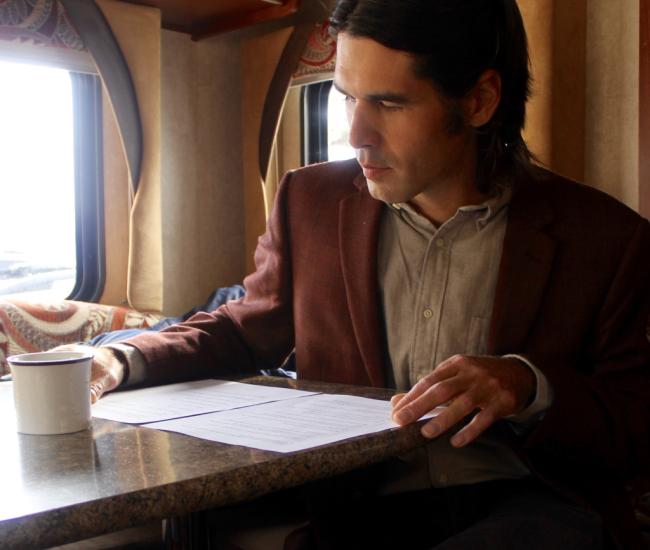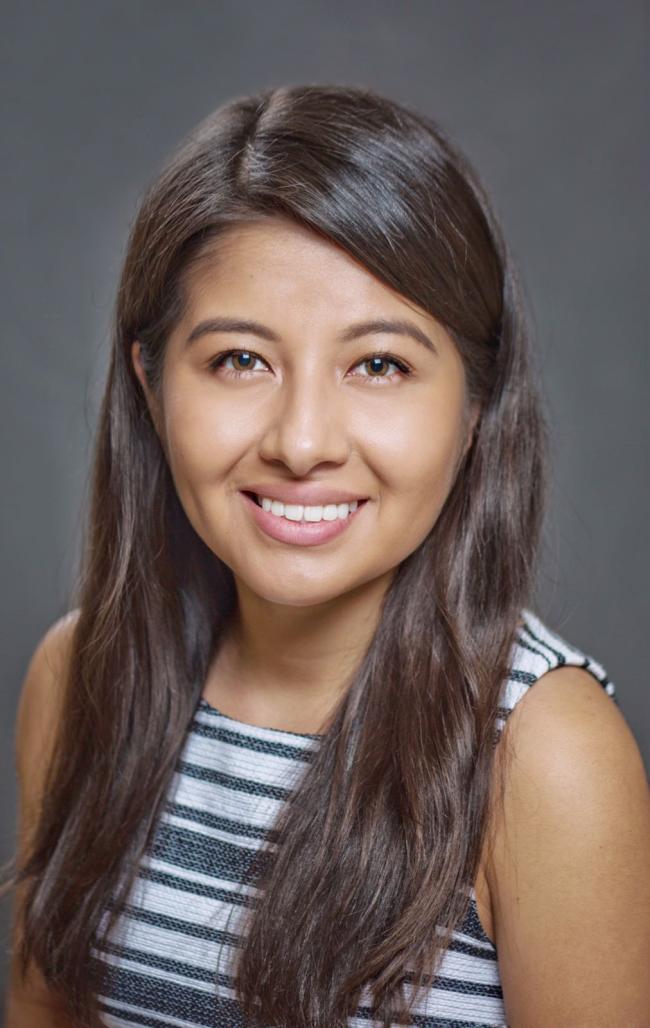Winter Symposium Day 2019
Social Justice
Wednesday, January 16, 2019
Schedule overview
9-10 a.m.
Featured Presenter: Rebecca Ginsburg
Session I
10:15-11:15 a.m.
Featured Presenter: Scott Warren, Ph.D.
Session II
11:30 a.m.-12:30 p.m.
Featured Presenter: Lizeth Tamayo ’16, M.P.H.
Featured Panel: Mark Johnson '91, Brian Duffy, Peter Marty, Joe Slavens
Session III
12:30-4:30 p.m.
Time Reserved for Advising – Students, please look for communications from your advisor for more information.
1-2 p.m. and 3:30-4:30 p.m.
“Get Ready to Explore More: Semesters at Augustana” – Transition Coordinators Jayne Rose and Gillian Lederman
7-8:30 p.m.
Featured Presentation: Fury Young, BL Shirelle and Maxwell Melvins

SESSION I 9-10 a.m.
FEATURED PRESENTATION
Why Prison Education Is (Usually) Social Justice Work
Rebecca Ginsburg
Director, Education Justice Project, University of Illinois
The Gerber Center for Student Life, Gävle Room
Criminal justice reform has been called the civil rights issue of our time. People sometimes point to prison education programs as one way to support that agenda. Rebecca Ginsburg, who directs the Education Justice Project, a prison education program based at the University of Illinois, argues that American society needs much more than criminal justice reform. Instead, we need a comprehensive re-assessment of the U.S.’s current approach to interpersonal violence and harm. Based on her work with incarcerated students, their families, prison instructors, and prison staff, she makes a case that prison education can indeed be liberating and transformative—provided that it forms part of deeper and more substantive efforts to re-think our system of penal incarceration.
SESSION I 9-10 a.m.
On-Side? The Ethics of Watching Sports
Brett Biebel, English
Olin Auditorium
I spend thousands of hours every year watching, listening to, and talking and thinking about sports. I enjoy them, I am entertained by them, and I'm even moved by them. And, yet, organized sports are built on a questionable foundation. Major League Baseball teams do everything in their power to avoid paying their minor leaguers a living wage. Soccer fans sing racist songs. Sneaker companies bribe athletes to attend the universities they sponsor. The questionable behavior of individual athletes is overlooked, or even enabled, as long as those athletes help their teams win. So, why do I keep watching? Is it wrong to do so? Can a fan (which is short for fanatic) be ethical? This session will discuss those questions.
Microaggressions: From Reaction to Resistance
Effua E. Sosoo, psychology and neuroscience, The University of North Carolina at Chapel Hill
Olin Center 305
This session seeks to help attendees identify microaggressions, shift from reaction to resistance, and learn to tactfully and effectively manage microaggressive situations.
Social Justice Through Art
Kelli Feigley, entertainment media; Jeff Coussens, theatre arts; Estlin Feigley, entertainment media; Amy Blommer, MJMC
Wilson Center
Throughout history, art has been used as a way to raise awareness about social issues and affect positive change. Using the current production of Augustana's Penguin Project and related Fresh Films/Augustana documentary "I AM not disABLEd" as our launch pad, we will engage students in how art—whether visual art, performing art, documentaries, and even scripted films and TV shows—can advocate for social justice and causes. And how even large-scale theatre (Broadway) and media (TV, film) can both entertain and advocate.
Countering Islamophobia Through Performing Arts
Dr. Cuma Ozkan, religion; Jessica Beyer, biology; Pierceson Mapes, communication studies; Tyler Bentley; Brittany Tommila, biology
Hanson Hall of Science 304
The widespread acceptance of Islam’s equalization with terrorism and the root cause of sweeping generalizations about Islam primarily come from the existence of one type of a narrative, which highlights violent actions of a minority group in Islam. Drawing on the ethnographic data collected by Dr. Cuma Ozkan at the Hancher Auditorium, this panel will explore the possibilities of performing arts to create greater multicultural understanding, reduce prejudice, and increase awareness and appreciation of Muslim diversity. Overall, the panel will address to what extent cohorts’ aesthetic and artistic exposure increase their awareness of Muslim diversity and multicultural understanding. In the panel, Dr. Ozkan will introduce the ethnographic study on Islamic performing arts and students Jessica Beyer, Tyler Bentley, Pierceson Mapes and Brittany Tommila will present different cases drawn from this study.

SESSION II 10:15-11:15 a.m.
FEATURED PRESENTATION
A New Kind of Company Town: Landscape Humanitarian Aid, and the Border Industry in Southwestern Arizona
Dr. Scott Warren
Cultural geographer from Ajo, Ariz.
The Gerber Center for Student Life, Gävle Room
Mexico, the United States and the O’odham nation come together and break apart into reservations, wildlife refuges, national parks, bombing ranges and international boundaries. In recent decades, enforcement policies have shifted migrant crossing routes across this patchwork landscape in southwestern Arizona. As a result, thousands of undocumented border crossers have died in its rugged mountains, canyons and deserts. Local residents, NGOs and others provide humanitarian aid to those who cross the desert and search for those who are lost. Meanwhile, the coupled interdiction-smuggling industry exploits migrant bodies with increasing ferocity. The expansion of this coupled industry offers no security; rather, it promises only heavy burdens on land and life in the border region and beyond.
SESSION II 10:15-11:15 a.m.
Prisoners' Rights, Solitary Confinement, and Mental Health
Anthony Gay; Rev. Mariah Marlin-Warfield, Church of Peace, Rock Island; Dr. Carrie Hough, anthropology; Nicole Schult, attorney, Uptown People's Law Center
Olin Auditorium
At least 80,000 people are held in "restrictive housing," including solitary confinement, in the United States each day. This session will explore the contemporary U.S. prison system through the experiences of Anthony Gay, a Rock Island native who endured two decades of imprisonment and solitary confinement in Illinois state prisons. Gay's story, and his commitment to ending cruel and unusual treatment of prisoners, speaks to the urgent need to reform the U.S. criminal justice and corrections systems.
Understanding the Effects of and Responses to Privilege Through Intergroup Monopoly
Dr. Lisa Szafran, psychology and neuroscience; Dr. Robert Wengronowitz, sociology, anthropology and social welfare
Wilson Center
Ever heard the phrase "don't judge someone until you've walked a mile in their shoes"? Why not learn that same lesson while playing a game according to someone else's rules. Come play a game of Monopoly and get a lesson in social justice and perspective-taking at the same time. Game play will be followed by a discussion of your experience moderated by a group of faculty members representing psychological and sociological perspectives.
Real Talk: I'm Not Racist
Lydia Lara, president of Dat Poetry Lounge; Ashanti Mobley, Jordan Cray, Talayah Lemon (Black Student Union Executive Board members) and Giselle Carter, Laila Barber, Mikaylo Kelly
Black Box, Brunner Theatre Center
The student group "Dat Poetry Lounge" hosts a real conversation about the ongoing racial tensions growing across the United States. From anti-blackness, white supremacy and racist power structures in society, it's time to sit down and talk to each other about ways they perpetuate within our society and what they look like in practice. We will watch Joyner Lucas' "I'm not racist" and dissect the rap song by having an honest conversation or "real talk" where students feel free to speak up and learn together, regardless of opinion or background. Together we can learn about why non-black individuals should not use the N-word, learn about performative ally-ship, and understand new ways of thinking in an ever-evolving and racially polarized era.
Stigmatized Performance Practices, Sexual Labour and Caste in India
Dr. Anagha Tambe, Five College Women’s Studies Research Center, Mount Holyoke College
Olin Center 305
This lecture investigates the transformations in performance labour in contemporary Maharashtra, India, by studying the experiences and voices of women performers. The study focuses on two popular cultural practices of ritual and/or erotic dance and music that involve "lower caste" hereditary women artists and explores how both the practices, albeit differentially, are legitimized as "folk art" of the region and consequently celebrated and supported by the state; but how these practices simultaneously have come to be marked as "vulgar" in terms of being sexually degenerated, trivial, crude and unrefined, and lacking artistic skills. Dr. Anagha Tambe aims to analyze how these popular performance practices are structured by gendered labour markets, stigmatized by pervasive caste hierarchies and mediated by normative sexuality.
Customers Strike Back: Perceived Business Social Justice of Customers When Things Go Badly
Dr. Hyeong-Gyu Choi, business administration
Hanson Hall of Science 304
The notion of social justice—fair and equitable access to the same rights, resources, distribution of power and obligation for all members of society—not only is applicable to wide social phenomenon, but also is one of the root causes for failed customer experiences of many businesses. This is especially due to the pursuit of customer service excellence and accommodating customers’ experience from very first contact with firms to customers’ departure from the firms, have been widely embraced by modern-day customers and have become social norms from their perspective. The session will discuss and encourage open dialogue regarding the impact of modern-day customers’ perceived business social justice and the significance of active management of companies’ digital endeavors.

SESSION III 11:30 a.m.-12:30 p.m.
FEATURED ALUMNI PRESENTATION
Learning To Stand as a Giant: An Unfinished Story of a Latina Immigrant in Academia
Lizeth Tamayo ’16, M.P.H.
Doctoral student in genetic epidemiology, University of Chicago
The Gerber Center for Student Life, Gävle Room
As a Peruvian immigrant, I have learned to navigate many things on my own. Learning to navigate academia was not one of them. I will guide you through my journey in academia, highlighted by the giants who have helped shape it, while also describing some of my research in health disparities. Today, as a Ph.D. student, I am starting to learn how to be a giant myself.
FEATURED PANEL
Conservative Insights on Social Justice
Mark Johnson '91, director of Federal Government Relations for Toyota, Washington, D.C.; Brian Duffy, chief operating officer for Per Mar Security Services, Davenport, Iowa; Peter Marty, senior pastor for St. Paul Lutheran Church, Davenport, Iowa; Joe Slavens, president and chief executive officer for Northwest Bank, Davenport, Iowa
Olin Auditorium
What does a just society look like? How do conservative values influence perspectives on and action toward social justice? Panelists will reflect on social issues and the topic of social justice from conservative perspectives.
SESSION III 11:30 a.m.-12:30 p.m.
Martin Luther King's ‘Letter From Birmingham Jail’
Dr. Paul Olsen, English
Hanson Hall of Science 102
King's essay is one of the most important and relevant essays of the 20th century, and it may be even imperative in our 21st century. We will hand out the essay and consider/discuss the deep insights of King's analysis of racial conflict, morality and responsibility.
I Open My Mouth & Soil Pours Out
Rebecca Wee, English and creative writing; Laura Beuseling, English; Melissa Conway, English; Megan Gabler, English education; Shauntrice Gamble, psychology; Jack Harris, creative writing, Adarios Jones, psychology; Ryan Kairis, creative writing; Laura McNair, creative writing; Brenna Parson, creative writing; Cheyenne Powell, theatre arts; Rene Powers, English; Nicole Tennison, creative writing
Black Box, Brunner Theatre Center
Please join us for an open/community poetry reading, led by students from Forms of Poetry (ENCW330). For the first half hour, they will read poems they've written that involve social justice concerns; afterward, they will invite the audience to share their own poetry, or poems by others that matter to them.
Social Justice in Brazil Under a Far-Right President
Dr. Mariano Magalhães, political science; Alexis Ryckaert, Ghita el Mendri, Caroline Wator, Elisa Klewinski, political science; Juliana Pinheiro, psychology
Olin Center 305
In October 2018, Brazilians went to the polls and elected a far-right politician as president. The newly elected president was a supporter of the military regime, called out a fellow member of Congress as too ugly to rape, openly pushed for the exile and imprisonment of leftist activists, and claimed he would rather his son be killed in a horrific accident than be gay. In this session, Brazilian students and students who participated in the Brazil Term program will share their thoughts on what this new administration means for most ordinary Brazilians.
Gangs & Greek Groups
Ashanti Mobley and Mayra Arevalo, Multicultural Programming Board; Mikey Carvajal
Hanson Hall of Science 304
We will explore the injustices that influence societal views when it comes to neighborhood gangs and Greek groups. We will look to find the fundamental similarities within the groups, yet note the undeniable privilege certain groups have due to race, social economic status and higher education. While exploring such injustices, our aim is to recognize the similarities within groups without dismissing key differences that must be noted to understand how privilege creates power and distinction.
7-8:30 p.m.
FEATURED PRESENTATION
Die Jim Crow: Changing the Prison Narrative Through Music
Fury Young, BL Shirelle and Maxwell Melvins
Wallenberg Hall (inside Denkmann Memorial Building)
Since the early 1900s, music has been recorded in American prisons nationwide. There have been several incarcerated musicians whose work has reached a wide audience—Leadbelly, The Prisonaires, The Goree All Girl String Band, The Escorts, Lifers Group—but never has a music project gone into prisons in states across the country and turned these recordings into a concept album. This is what the Die Jim Crow project is doing. Begun in 2013 by artist/activist Fury Young, the Die Jim Crow LP will be released in late 2020, featuring music by formerly and currently incarcerated artists across America. Two of these artists, BL Shirelle and Maxwell Melvins, will join Young in this keynote presentation-meets-performance designed to inspire and motivate.
Drop-in events 9 a.m.-12:30 p.m.
Create for a Cause
Dr. John Pfautz, convener, Center for Creativity
CATalyst LAB – Bergendoff 103
The Center for Creativity's CatLab will be open from 9 a.m. until 4 p.m. for members of the Augustana community to create in support of social justice—perhaps a poster, painting, poem, song, flyer. Materials and display space provided.
Why Should We Care About Zines?
María Emerson, Tredway Library
The Gerber Center for Student Life, Fourth Floor Near Fireplace
Zines (pronounced zeens), are small-circulation, self-published works. The Tredway Library recently started a zine collection that focuses on social justice issues, covering such subjects as eating disorders, anxiety, discrimination, LGBTQ+ issues and more. The collection aims to provide stories and personal experiences often overlooked in mainstream publications. Drop by to learn about the history and purpose of zines, look through the library’s zine collection and make a one-page mini zine (materials provided).
A Vow to Take Action
Noah-Christina Reed; Dr. Paul Croll, sociology
The Gerber Center for Student Life, Fourth-floor Hallway
This session offers an intrapersonal, interpersonal and communal solution to promote the wide spectrum of social justice. Take the pledge of social liberation for all those who are generally and situationally oppressed. This pledge signifies a commitment to demand social justice and create a safe space for all persons.
Additional events/presentations
12:30-4:30 p.m.
Time Reserved for Advising – Students, please look for communications from your advisor for more information.
1-2 p.m. and 3:30-4:30 p.m.
Get Ready To Explore More: Semesters at Augustana
Jayne Rose and Gillian Lederman, semester transition coordinators
The Gerber Center for Student Life, Gävle 3
Two identical presentations for students that provide an overview of significant changes as Augustana transitions to semesters in fall 2019.
Symposium Day is financially supported by the Institute for Leadership and Service and by the Office of Academic Affairs.
